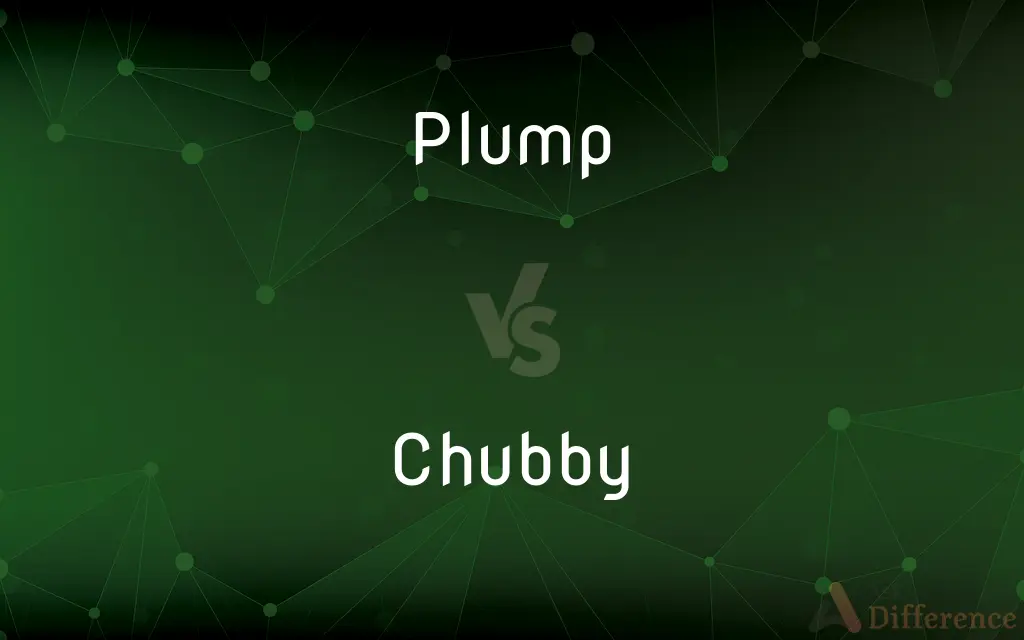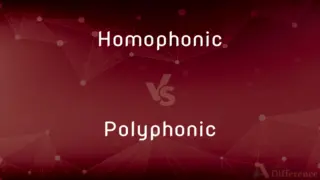Plump vs. Chubby — What's the Difference?
Edited by Tayyaba Rehman — By Fiza Rafique — Updated on March 15, 2024
Plump often implies a fuller, rounded form that's generally healthy, while chubby suggests a softer, slightly excess fleshiness, often used affectionately.

Difference Between Plump and Chubby
Table of Contents
ADVERTISEMENT
Key Differences
Plumpness typically conveys a sense of rounded fullness that can be associated with healthiness and vitality, often used to describe fruits, cheeks, or overall body shape in a positive light. Whereas, "chubby" often carries a more endearing or affectionate tone, usually referring to the soft, slightly excessive fleshiness, particularly in babies or children, and sometimes used playfully among elders.
While "plump" can denote a healthy and attractive level of fullness, especially in contexts like "plump lips" or "plump fruits," suggesting juiciness or ripeness, "chubby" tends to imply a greater degree of softness and fleshiness, often without the same connotations of health or vitality.
"Plump" might be used in a broader range of contexts, not solely limited to body weight, but also to describe objects or features that are full and rounded. On the other hand, "chubby" is more narrowly used, primarily focusing on body features, particularly those that are soft and pudgy.
The perception of plumpness and chubbiness can vary significantly across different cultures and historical periods. Plumpness has sometimes been associated with prosperity and health, while chubbiness, especially in children, is often seen as a sign of good health and well-being, although the contexts and perceptions can shift.
In terms of aesthetics, "plump" may carry more positive or neutral connotations, being associated with attractiveness in certain features, while "chubby" is often seen through a more affectionate, sometimes humorous lens, especially when referring to babies or young children.
ADVERTISEMENT
Comparison Chart
Connotation
Fuller, rounded, often associated with health
Soft, slightly excessive fleshiness
Common Usage
Can refer to overall body shape or specific features
Primarily used for body features
Tone
Neutral to positive
Affectionate, sometimes playful
Context
Broad, including objects and features
More narrowly focused on bodily softness
Cultural Perception
Varies, can denote prosperity or health
Often seen as cute or endearing, especially in children
Compare with Definitions
Plump
Full and rounded, often indicating health or vitality.
The garden was filled with plump, ripe tomatoes ready for harvest.
Chubby
Refers to a soft, slightly excessive fleshiness, often used affectionately.
The baby's chubby cheeks were irresistible.
Plump
Describes something that is well-filled out or rounded, not necessarily related to weight.
She settled into the plump cushions of the sofa.
Chubby
Can be used playfully among elders, but with a gentle touch.
She pinched his chubby cheeks in a playful gesture.
Plump
Sometimes used to describe a pleasantly full figure.
The portrait captured her plump, cheerful cheeks.
Chubby
While often endearing, can be sensitive when referring to elders.
He laughed off the comment about his chubby frame.
Plump
Can be used in a broader context beyond body shape, indicating abundance or richness.
He enjoyed the plump textures in the painting.
Chubby
Often associated with the roundness of babies or young children.
Her toddler's chubby hands grabbed for the toy.
Plump
Can suggest a desirable fullness or richness.
The plump berries made the perfect topping for the dessert.
Chubby
Sometimes implies a level of cuddliness or warmth.
The chubby kitten curled up in her lap.
Plump
Well-rounded and full in form; chubby.
Chubby
Rounded and plump.
Plump
Abundant; ample
A plump reward.
Chubby
(Informal) A chubby person.
Plump
Blunt; direct.
Chubby
Of a person: slightly overweight, somewhat fat, and hence plump, rounded, and soft.
Obviously the chubby child was eating too much.
Plump
To make well-rounded or full in form
Plumped up the pillows.
Chubby
Of a body part: containing a moderate amount of fat.
It’s quite normal for babies to have chubby cheeks.
Plump
To become well-rounded, chubby, or full in form
The baby plumped out at three months.
Chubby
A chubby, plump person
Plump
To drop abruptly or heavily
Plumped into the easy chair.
Chubby
An overweight or obese gay man.
Plump
To give full support or praise
Plumped for the candidate throughout the state.
Chubby
(slang) A penile erection, especially when short and with a large circumference; a boner.
Hey, Lucius, I just wanted to share a piece of personal information with you. I've got a... a chubby right now because [starts screaming] This is one of the most awesome experiences of my life!—Talladega Nights: The Ballad of Ricky Bobby
Plump
To throw down or drop (something) abruptly or heavily
Plumped the books onto the table.
Chubby
Like a chub; plump, short, and thick.
Plump
A heavy or abrupt fall or collision.
Chubby
Euphemisms for slightly fat;
A generation ago...buxom actresses were popular
Chubby babies
Pleasingly plump
Plump
The sound of a heavy fall or collision.
Plump
With a heavy or abrupt drop
The anchor fell plump into the sea.
Plump
With a full or sudden impact
Walked plump into the pole.
Plump
Directly
Ran plump into an old friend.
Plump
Without qualification; bluntly
Spoke out plump for the tax bill.
Plump
Having a full and rounded shape; chubby, somewhat overweight.
A plump baby; plump cheeks
Plump
Fat.
Plump
Sudden and without reservation; blunt; direct; downright.
Plump
(intransitive) To grow plump; to swell out.
Her cheeks have plumped.
Plump
(transitive) To make plump; to fill (out) or support; often with up.
To plump oysters or scallops by placing them in fresh or brackish water
Plump
(transitive) To cast or let drop all at once, suddenly and heavily.
To plump a stone into water
Plump
(intransitive) To give a plumper (kind of vote).
Plump
(transitive) To give (a vote), as a plumper.
Plump
To favor or decide in favor of something.
Plump
(intransitive) To drop or fall suddenly or heavily, all at once.
Plump
Directly; suddenly; perpendicularly.
Plump
The sound of a sudden heavy fall.
Plump
(obsolete) A knot or cluster; a group; a crowd.
A plump of trees, fowls, or spears
Plump
A group of geese flying close together.
Plump
Well rounded or filled out; full; fleshy; fat; as, a plump baby; plump cheeks.
The god of wine did his plump clusters bring.
Plump
Done or made plump, or suddenly and without reservation; blunt; unreserved; direct; downright.
After the plump statement that the author was at Erceldoune and spake with Thomas.
Plump
A knot; a cluster; a group; a crowd; a flock; as, a plump of trees, fowls, or spears.
To visit islands and the plumps of men.
Plump
To grow plump; to swell out; as, her cheeks have plumped.
Plump
To drop or fall suddenly or heavily, all at once.
Plump
To give a plumper. See Plumper, 2.
Plump
To make plump; to fill (out) or support; - often with up.
To plump up the hollowness of their history with improbable miracles.
Plump
To cast or let drop all at once, suddenly and heavily; as, to plump a stone into water.
Plump
To give (a vote), as a plumper. See Plumper, 2.
Plump
Directly; suddenly; perpendicularly.
Plump
The sound of a sudden heavy fall
Plump
Drop sharply;
The stock market plummeted
Plump
Set (something or oneself) down with or as if with a noise;
He planked the money on the table
He planked himself into the sofa
Plump
Make fat or plump;
We will plump out that poor starving child
Plump
Give support (to) or make a choice (of) one out of a group or number;
I plumped for the losing candidates
Plump
Euphemisms for slightly fat;
A generation ago...buxom actresses were popular
Chubby babies
Pleasingly plump
Plump
Straight down especially heavily or abruptly;
The anchor fell plump into the sea
We dropped the rock plump into the water
Common Curiosities
Is "chubby" used in a negative way?
Typically, it's used affectionately, though context matters.
Is "chubby" only applicable to humans?
Primarily, but it can also affectionately describe animals.
What does "plump" generally imply?
A healthy, rounded fullness.
Can "plump" be used to describe non-living things?
Yes, it can describe anything with a full, rounded appearance.
Are "plump" and "chubby" interchangeable?
They share similarities but differ in connotation and specific usage.
What's a non-offensive way to refer to someone's fuller figure?
Context and relationship with the person matter; "full-figured" might be more neutral.
Can "plump" imply excess?
Less so than "chubby"; it's often seen in a more positive light.
Does "chubby" imply health concerns?
Not necessarily; it's often used to denote a harmless, soft roundness.
Can "chubby" be considered cute?
Yes, particularly when referring to babies and children.
Does "plump" carry positive connotations?
Often, especially when describing features like lips or fruits.
Is it appropriate to describe someone as "plump"?
It depends on context and cultural sensitivity.
Is "chubby" derogatory?
It can be sensitive, but it's often used affectionately, especially with children.
How can one sensitively address someone's body shape?
It's generally best to avoid unsolicited comments about body shape.
Can "plump" be used in fashion?
Yes, it can describe desirable features like full lips or cheeks.
Can cultural perceptions of "plump" and "chubby" vary?
Absolutely, perceptions are influenced by cultural standards and historical context.
Share Your Discovery

Previous Comparison
Ingest vs. Digest
Next Comparison
Homophonic vs. PolyphonicAuthor Spotlight
Written by
Fiza RafiqueFiza Rafique is a skilled content writer at AskDifference.com, where she meticulously refines and enhances written pieces. Drawing from her vast editorial expertise, Fiza ensures clarity, accuracy, and precision in every article. Passionate about language, she continually seeks to elevate the quality of content for readers worldwide.
Edited by
Tayyaba RehmanTayyaba Rehman is a distinguished writer, currently serving as a primary contributor to askdifference.com. As a researcher in semantics and etymology, Tayyaba's passion for the complexity of languages and their distinctions has found a perfect home on the platform. Tayyaba delves into the intricacies of language, distinguishing between commonly confused words and phrases, thereby providing clarity for readers worldwide.
















































